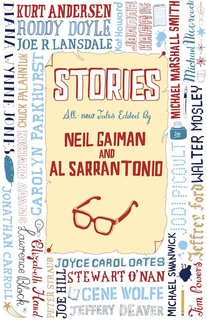This year I have been greedily gobbling up as many as I can find – in anthologies, websites, magazines and journals – so much so, in fact, that I wonder whether I should give each one time to settle in my mind before moving on to the next one. A good short story should indeed be powerful: capable of packing a full punch that any good novel would be capable of, but within only a few thousand words. The test for me, I think, is how much I can remember of it two to three days after finishing, and whether the emotional ups and downs, or conflict, of the story has stayed lodged in my consciousness. Thus maybe a little ‘absorbing’ time after I finish each one may be in order. If I can withstand the temptation, that is…
One thing I don’t want to do here is to analyse, at least any more than my somewhat unoriginal attempt above, what makes a good short story. It’s been done so many times already, not least in the prefaces of the various anthologies I’ve been reading, that this overdose of advanced literary theory has made my head spin. Character driven vs plot driven; implied vs explicit; the power of words left unsaid vs too much information; what makes a cliché and how to avoid them; using metaphor to discern the difference in style and technique between short stories and novels; even line graphs to illustrate plot arcs. There’s so much that’s been said that I don’t think I could add any more.
As a writer, I’m still trying to find my way. Admittedly, this is mostly by making mistakes and learning from feedback, either from my writers’ groups or from competition/rejection post-mortems. Also, of course, from reading, reading, reading, and seeing what other writers are doing well and how I can learn from them – plus comparing and contrasting the different anthologies and competition results to see what one editor/judge may like. What do they think makes a good short story, as opposed to another editor/judge?
It’s interesting to see how opinions differ. One judge of a recent short story competition bemoaned the entrants who tried to do ‘too much’ within a mere three thousand words, with the fast pace leaving him exhausted (sure enough, the winning stories were all tales where, to be quite honest, nothing much happened at all – and therein lay the art of them).
Yet, another anthology I’ve been reading (namely, "Stories", edited by Neil Gaiman and Al Sarrantonio) worked to the brief that each story should make the reader ask themselves "And then what happened?" To my mind this implies the opposite; they wanted page turners, ergo, a bit of pace and, dare I say it, action. OK, they were skilfully done, and each one works perfectly within the short story form – but I wonder whether any of them would have been rated in that aforementioned competition.
That’s not to say one’s right and one’s wrong, of course. As a previous commenter on my blog has mentioned, if you’re a writer and wish to be published (or win a competition), it’s about targeting your story to an editor or judge who may actually like it. If that needs research, then so be it – i.e. if I see a competition, recognise the name of the judge, know his/her style or the sorts of stories he/she’s rated in competitions before, then I’ll have a much better idea what to submit of my own. Likewise, with anthologies, having read volumes of them over the past few months, I have (I hope) a fairly good idea of the kind of stories which may go down well in those volumes, and will target them accordingly.
I hear a lot about competition judges and anthology editors who complain about submissions written by authors who have clearly never read anything in their catalogues before. And – I will hold my hands up here – this would have been me, in the distant past. Crazy, rookie mistake – and not one I will make again.
This more considered approach is starting to pay off, both in terms of confidence in my own writing and acceptances, which is slowly but surely creeping upwards.
If you have any recommendations for me, please leave a comment!
The Fiction Desk
Unthank Books
Riptide Journal
Cinnamon Press
Earlyworks Press
Salt Publishing
Comma Press
Short Fiction Journal
Eibonvale Press
Competition anthologies of prizewinners/shortlisted entrants from the Bridport Prize, Bristol Prize and Willesden Herald
Not read yet but high on my shopping list: prizewinning anthologies from Biscuit Publishing and Fish Publishing
